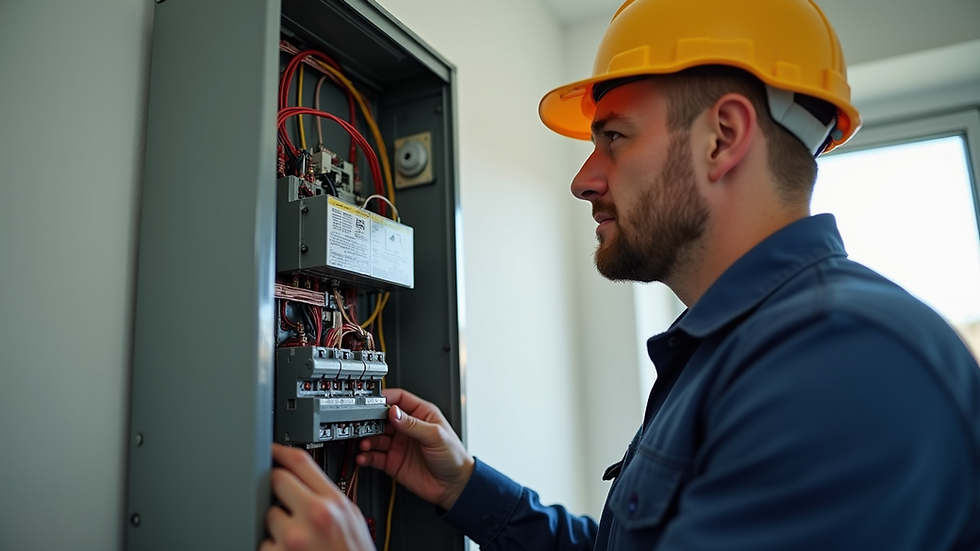Understanding the Different Types of Electrical Services
- oliverroberts100
- May 18, 2025
- 3 min read
Electrical services play a crucial role in ensuring that your home and workplace function efficiently and safely. Whether you’re building a new property, renovating an existing one, or experiencing issues with your current electrical setup, understanding the various types of electrical services available can help you make informed decisions. This guide aims to clarify these services and provide actionable insights.
Types of Electrical Services
Electrical work can encompass a wide range of tasks. Here are some of the most common types of electrical services you may encounter:
1. Residential Electrical Services
Residential electrical services are designed for homes and apartments. These services include:
Wiring and Rewiring: This involves installing new wiring systems or upgrading existing ones to meet current safety standards. Older homes may require rewiring to ensure that they can support modern electrical loads.
Electrical Panel Upgrades: As households use more electricity, older panels may be unable to handle the demand. Upgrading can improve efficiency and safety.
Lighting Installation: This service includes installing new lights, whether it's ambient lighting, task lighting, or decorative fixtures.

2. Commercial Electrical Services
Commercial electrical services cater to businesses and larger buildings. These may include:
Electrical System Design: This entails planning the electrical layout for a building, ensuring all needs are met while complying with safety regulations.
Maintenance and Repairs: Regular maintenance helps prevent costly downtimes. Services may involve inspecting wiring, circuit breakers, and outlets.
Emergency Services: Many commercial electricians offer emergency services to quickly address any issues that might disrupt business operations.

3. Industrial Electrical Services
Industrial environments require specialized electrical services due to the complexity of equipment and systems. These services often include:
Industrial Automation: This includes automating machinery for increased efficiency, precision, and safety.
High-Voltage Services: Industrial applications often involve high-voltage installations that require specially trained professionals.
Power Distribution: Proper distribution of power is crucial in industrial settings to prevent overloads and ensure smooth operations.

How much should I pay an electrician per hour in the UK?
The cost of hiring an electrician can vary widely depending on several factors, including:
Location: Electricians in urban areas may charge more than those in rural locations due to higher living costs.
Experience: More experienced electricians usually command higher rates because of their skill level.
Type of work: Routine maintenance may be less expensive than emergency call-outs or complex installations.
On average, you can expect to pay between £40 and £70 per hour for an electrician in the UK. Always ask for a detailed estimate before starting any work to avoid surprises.
Choosing the Right Electrical Service for Your Needs
When selecting an electrical service, consider the following steps:
Identify Your Needs: Understand exactly what work you need to be done. Is it a simple repair, or do you require a complete overhaul?
Research Professionals: Look for licensed and insured electricians. Check reviews and ask for referrals from friends or family.
Get Multiple Quotes: Don’t settle for the first quote. Obtain several estimates and compare them to understand the market rate.
Check Credentials: Make sure the electrician holds the necessary qualifications and certifications.
Ask About Warranties: Inquire about warranties for the materials used and the service provided. Quality professionals often stand by their work.
Safety Considerations
Safety should always be a priority when dealing with electrical services. Here are some essential tips:
Hire Licensed Professionals: Ensure the person you hire is fully licensed and insured.
Follow Local Codes and Regulations: Every community has specific regulations regarding electrical work. A qualified electrician will adhere to these codes.
Educate Yourself: Familiarize yourself with basic electrical safety, including the importance of circuit breakers and the risks of tampering with electrical systems.
Sustainable Electrical Services
As awareness of environmental issues increases, many homeowners and businesses are opting for sustainable electrical services. These may include:
Solar Panel Installation: This is becoming increasingly popular as a renewable energy source, reducing reliance on fossil fuels.
Energy-Efficient Lighting: Switching to LED lighting can significantly reduce energy consumption.
Smart Home Integration: Smart technologies can enhance energy efficiency by allowing clients to control systems remotely and monitor energy usage.
Sustainable practices not only help the environment but also lead to long-term savings on electricity bills.
Final Thoughts
Understanding the different types of electrical services can empower you to make the right decisions for your home or business. From simple repairs to large-scale installations, knowing what services are available will help you optimize safety and efficiency.
When in doubt, always consult a qualified electrician for guidance and support in your electrical projects. Prioritizing professional services can save you both time and money in the long run.





Comments